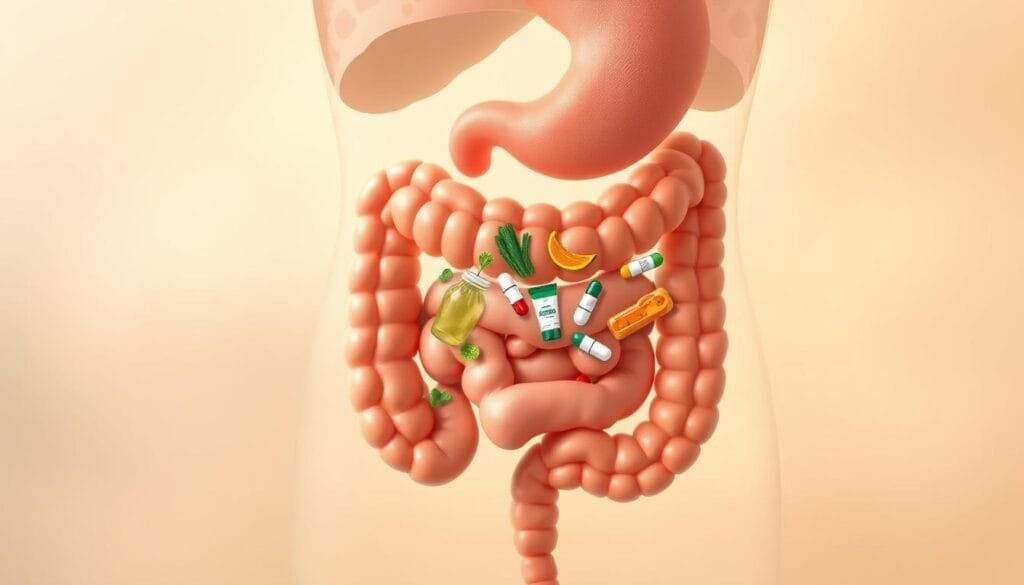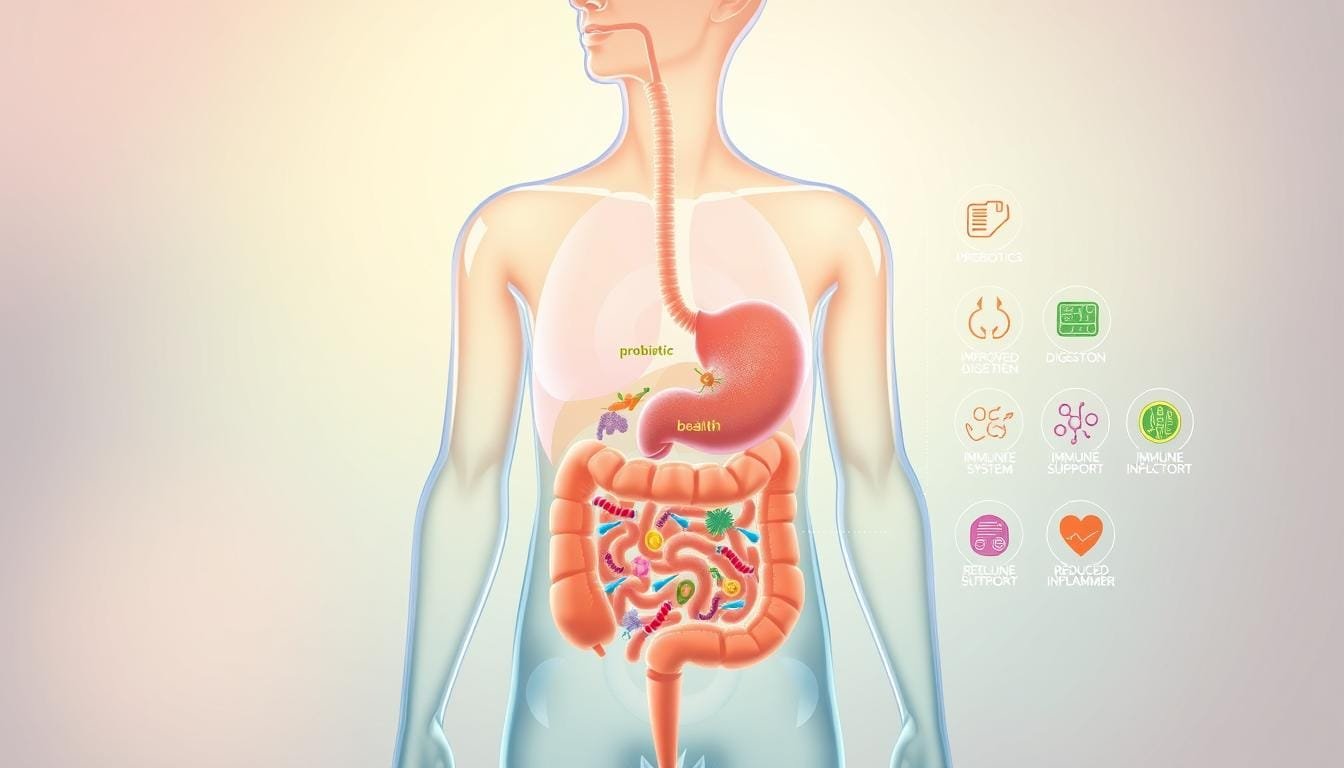Currently Empty: RM0.00
Trillions of microorganisms live in the human body, forming a complex ecosystem that impacts overall wellness. Among these, probiotics stand out as beneficial bacteria that support digestion and other vital functions. These live microorganisms work synergistically with the body’s natural flora, helping maintain a balanced gut environment critical for physical and mental health.
Modern lifestyles often disrupt this delicate balance. Factors like processed foods, stress, or antibiotics can reduce microbial diversity, potentially leading to digestive discomfort. By introducing specific strains of friendly bacteria, probiotics help replenish and stabilize the gut microbiome. This process supports nutrient absorption and strengthens the body’s defenses against harmful pathogens.
Research continues to reveal connections between gut health and broader wellness outcomes. A thriving microbial community not only aids digestion but also influences immune responses and even mood regulation. For those exploring natural ways to enhance their well-being, understanding how probiotics function offers valuable insights. The health benefits of probiotics extend beyond basic gut support, making them a key component of holistic health strategies.
Key Takeaways
- Probiotics are live microorganisms that promote a balanced gut environment
- They assist in nutrient absorption and protect against harmful bacteria
- Modern stressors like poor diet or medications can disrupt gut flora
- A diverse microbiome supports immune function and overall wellness
- Supplementation may help restore microbial balance in some individuals
Introduction to Probiotics and Gut Health
The human digestive system hosts a vibrant community of microbes essential for daily functions. Among them, probiotics—live beneficial bacteria—play a pivotal role in maintaining this inner ecosystem. These microorganisms contribute to processes ranging from breaking down food to synthesizing vital nutrients.
Understanding the Basics of Probiotics
Probiotics are naturally present in fermented foods like yogurt and kimchi, as well as in dietary supplements. They form part of the gut microbiome, a diverse network of bacteria, fungi, and viruses that interact with your body’s systems. This microbial community aids digestion, produces vitamins like B12 and K, and helps regulate inflammation.
The Role of the Gut Microbiome in Overall Wellness
A balanced gut microbiome acts as a protective shield, preventing harmful pathogens from entering the bloodstream. It also communicates with the immune system, training it to distinguish between friendly and dangerous invaders. Research shows that a healthy microbial environment may even influence mood and cognitive function through the gut-brain axis.
Factors like diet, stress, and antibiotic use can disrupt this delicate balance. For instance, a diet rich in fiber feeds beneficial bacteria, while processed foods may promote harmful strains. To learn how specific strains support wellness, explore the benefits of probiotics in maintaining this critical ecosystem.
What Are Probiotics and How They Work
Beneficial bacteria play a crucial role in maintaining digestive harmony. Probiotics are carefully chosen microorganisms that complement your body’s existing microbial communities. They arrive through supplements or fermented items, ready to support gut balance.

Definition and Natural Sources
These live microbes thrive in fermented foods like tangy kimchi, creamy yogurt, and fizzy kombucha. Unlike supplements, these sources offer lower concentrations of active cultures. Cottage cheese and miso soup also provide natural bacterial reinforcements for daily digestion support.
Mechanisms of Action in the Digestive Tract
Survival is key—probiotics must endure the stomach’s acidic environment to reach intestinal regions. Once established, they compete with harmful bacteria for space and nutrients. Some strains produce protective compounds, while others stimulate immune cells lining the digestive tract.
Effective probiotics strengthen intestinal barriers, preventing unwanted particles from entering the bloodstream. Research shows specific strains work best for particular needs, making targeted selection essential. Regular consumption helps maintain their protective effects throughout the gastrointestinal system.
Why Do You Need Probiotics for a Healthy Gut
Maintaining a thriving gut ecosystem requires consistent care, especially when modern life throws it off track. Stressful routines, processed meals, and medical treatments often reduce microbial diversity. Probiotic supplements or fermented foods act as reinforcements, helping the body recover its natural equilibrium.
Restoring Microbiome Balance After Disruptions
Antibiotics, while necessary, often wipe out both harmful and beneficial bacteria. This creates an imbalance that may lead to digestive discomfort or weakened defenses. Research shows specific probiotic strains can repopulate the gut with friendly microbes within weeks.
Illnesses and chronic stress also disrupt microbial harmony. Regular probiotic intake helps rebuild populations of Lactobacillus and Bifidobacterium—key players in nutrient absorption. Many healthcare professionals recommend them post-treatment to accelerate recovery.
Supporting Digestive and Immune Health
Nearly 80% of immune cells reside in the digestive tract, relying on a balanced microbiome. Probiotics strengthen intestinal barriers, preventing pathogens from entering the bloodstream. They also stimulate antibody production, enhancing the body’s ability to fight infections.
For those experiencing bloating or irregularity, these beneficial bacteria improve digestion by breaking down complex carbohydrates. Some strains produce short-chain fatty acids that nourish the gut lining. Daily supplementation creates an environment where both digestion and immunity thrive.
Probiotics and Their Benefits for Overall Health
The influence of beneficial bacteria stretches far beyond basic digestion, supporting multiple systems throughout the body. Regular intake of specific probiotic strains creates ripple health benefits that enhance physical and mental wellness through interconnected biological pathways.

Enhancing Digestive Function and Reducing Bloating
Studies show certain strains improve gut motility and break down hard-to-digest fibers, reducing gas production. This explains why many experience less bloating and discomfort after consistent probiotic use. For those with IBS or lactose intolerance, these microbes help manage symptoms by strengthening intestinal barriers.
Improving Skin, Mental Health, and Immune Support
Through the gut-skin axis, balanced microbiota may help clear acne and slow visible aging by reducing inflammation. The gut-brain connection allows probiotics to support serotonin production, potentially easing anxiety symptoms. Simultaneously, they train immune cells to respond effectively to threats without overreacting.
Potential Impacts on Weight Management
Emerging research suggests specific strains influence fat storage hormones and metabolic rates. By reducing low-grade inflammation linked to obesity, probiotics create an environment less favorable for weight gain. While not a standalone solution, they complement healthy lifestyle choices through these subtle effects.
Choosing the Right Probiotic Supplements and Foods
Selecting effective probiotics requires matching strains to individual health needs. Not all products deliver equal benefits—supplements and fermented foods each offer distinct advantages. Understanding these differences helps create personalized strategies for gut support.
Exploring Fermented Foods and Supplement Options
Yogurt, kimchi, and tempeh provide natural probiotics but contain varying bacterial levels. Fermented items work well for daily maintenance, while dietary supplements offer precise doses of targeted strains like Lactobacillus rhamnosus. Many people take both approaches to maximize microbial diversity.
Quality matters—since the FDA doesn’t regulate probiotics, third-party testing ensures potency. Look for products listing colony-forming units (CFUs) and expiration dates. Heat-resistant packaging preserves live cultures during storage and transport.
Consulting Healthcare Providers for Personalized Advice
Healthcare professionals help navigate strain-specific benefits. For example, Bifidobacterium breve supports immune function, while L. acidophilus aids lactose digestion. Those with chronic conditions should discuss probiotic supplements to avoid interactions.
Timing affects results—take probiotics with meals to improve survival through stomach acid. Reputable brands provide storage guidelines to maintain quality. Combining expert guidance with label scrutiny ensures optimal choices for lasting gut health.
Wellness Concept: Expert Guidance and Contact Information
Navigating gut health improvements becomes easier with professional support. Wellness Concept specializes in personalized strategies combining probiotics, prebiotics, and lifestyle adjustments. Their team analyzes how microbial strains interact with bodily systems, offering solutions for digestive comfort and immune resilience.
Operating Hours and Service Availability
Expert consultations are available Monday-Friday (9:30 AM-6:30 PM) and weekends (10 AM-5 PM). These hours accommodate diverse schedules, whether managing chronic diseases or optimizing daily health. Walk-ins receive the same attentive care as scheduled appointments.
WhatsApp Contact: +60123822655
For quick queries about probiotic strains or gut-friendly diets, message via WhatsApp. Advisors explain how specific cultures strengthen intestinal barriers or work with prebiotic fibers. Responses typically arrive within two business hours.
Wellness Concept tailors recommendations to Malaysia’s tropical climate and dietary preferences. Their approach helps maintain microbial balance while respecting local culinary traditions. Reach out to explore science-backed solutions for lasting digestive harmony.
FAQ
How do probiotics improve gut microbiome balance?
Probiotics introduce beneficial bacteria to the digestive tract, crowding out harmful microbes. This supports a balanced microbiome, which aids digestion, nutrient absorption, and immune function. Fermented foods like kimchi or yogurt (e.g., Activia) are natural sources.
Can probiotics reduce bloating and digestive discomfort?
Certain strains, such as Bifidobacterium or Lactobacillus, may alleviate bloating by breaking down undigested food. Studies link probiotics to improved symptoms in conditions like irritable bowel syndrome (IBS).
Are probiotic supplements better than food sources?
Supplements like Culturelle or Align offer targeted strains, but fermented foods (kefir, sauerkraut) provide diverse bacteria. Quality matters—look for CFU counts and third-party testing. A healthcare provider can recommend options based on individual needs.
Do probiotics support mental health or skin conditions?
Emerging research suggests gut-brain axis interactions may influence mood. Strains like Lactobacillus rhamnosus might reduce anxiety. For skin, probiotics in products like La Roche-Posay Toleriane can ease inflammation linked to eczema or acne.
How long does it take for probiotics to work?
Effects vary. Some notice changes in days, while others take weeks. Consistency is key—daily intake helps maintain bacterial balance. Those with antibiotic-related disruptions may see faster improvements.
Can children or pregnant individuals take probiotics?
Certain strains, such as Saccharomyces boulardii, are safe for kids. Brands like Gerber Soothe cater to infants. Pregnant individuals should consult doctors—probiotics like Garden of Life Prenatal are formulated for safety.
Are there risks to taking probiotics daily?
Most tolerate them well, but overuse might cause gas or cramps. Immunocompromised individuals should avoid certain strains. Always check labels for allergens and storage requirements.
How do I choose a high-quality probiotic supplement?
Opt for brands with strain specificity (e.g., L. acidophilus DDS-1), CFUs over 10 billion, and survivability features like delayed-release capsules. Renew Life Ultimate Flora and NOW Probiotics are reputable options.
Can probiotics help with weight management?
Some studies associate specific strains, like Lactobacillus gasseri, with modest weight loss. However, they’re not a standalone solution—pair with a balanced diet and exercise for best results.
How can I contact a healthcare provider for probiotic advice?
Wellness Concept experts are available via WhatsApp at +60123822655 from 9 AM to 6 PM daily. They offer personalized guidance on supplements, dosages, and gut health strategies.


